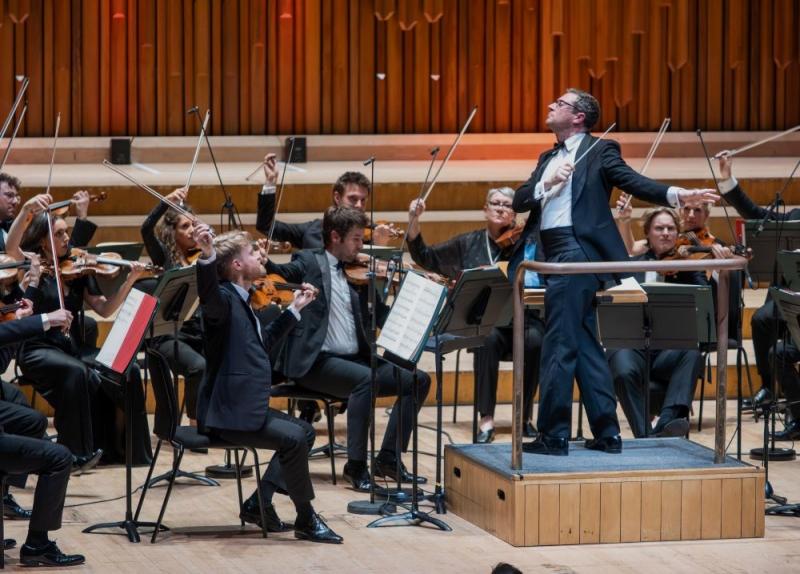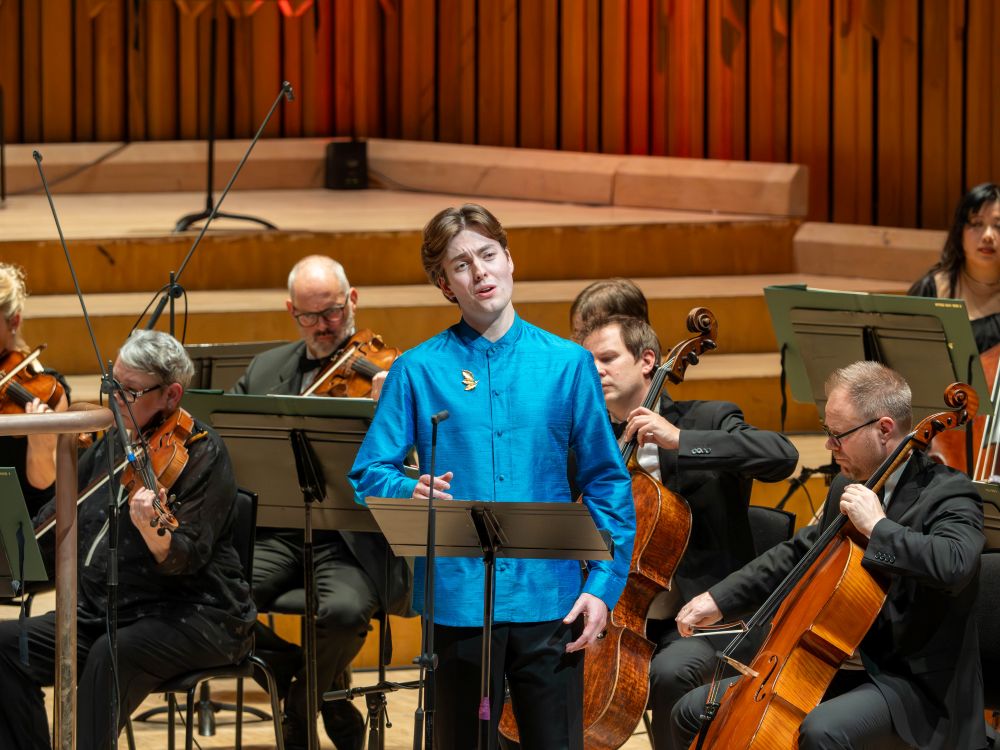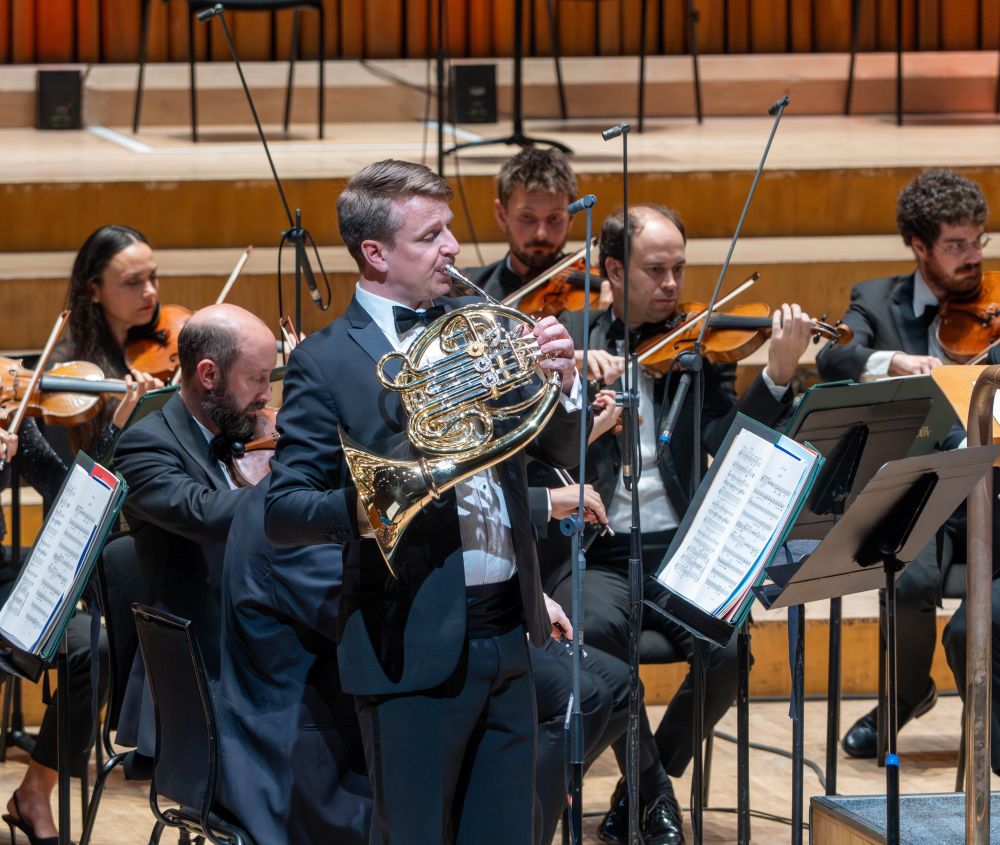Kilsby, Parkes, Sinfonia of London, Wilson, Barbican review - string things zing and sing in expert hands | reviews, news & interviews
Kilsby, Parkes, Sinfonia of London, Wilson, Barbican review - string things zing and sing in expert hands
Kilsby, Parkes, Sinfonia of London, Wilson, Barbican review - string things zing and sing in expert hands
British masterpieces for strings plus other-worldly tenor and horn - and a muscular rarity

It was guaranteed: string masterpieces by Vaughan Williams, Britten and Elgar would be played and conducted at the very highest level by John Wilson and his Sinfonia of London.
Would a rarity by Arthur Bliss and a slow movement from a Delius string quartet arranged by Eric Fenby match them? The otherworldly Delius did; the muscular Bliss, despite special pleading by John Wilson in an affable spoken introduction, sounded magnificent and was worth hearing, but not quite on the genius level.
No matter; this was a vintage Wilson programme, and the mastery of him and his players was immediately apparent in the softest, most magical sounds possible in Vaughan Williams’ infallible Fantasia on a Theme of Thomas Tallis – no easy task in the Barbican, which makes perspectives difficult. But those numinous chord progressions instantly took us into the beyond before the Tallis melody began to sing. Wilson had all the time in the (other) world for the outer hymns; the central rhapsody moved faster, but was graced with improvisatory-feeling solos from viola-player Edgar Francis and leader Charlie Lovell-Jones.  When we reached the exquisite final setting of Britten’s Serenade, of Keats’s Sonnet to Sleep, we felt we’d come home, but with the younger genius’s special stamp: more multi-part magic, with the additional balm and aching expression of young tenor Laurence Kilsby (pictured above). The last time I heard him sing Britten was as a treble, “a voice in a thousand” (forgive the self-quotation from 2011), in Tewkesbury Abbey. The voice is singular, obviously not extending to the power of an Allan Clayton, the most comprehensive interpreter of Britten and especially the Serenade we have at the moment. But the effect is akin to that I witnessed from Irish soprano Ava Dodd in the ENO Carmen – another voice that isn't big, but so alert to every word and its expressive possibilities that everything compels (especially here the baritonal colour in Blake’s “O Rose, thou art sick”).
When we reached the exquisite final setting of Britten’s Serenade, of Keats’s Sonnet to Sleep, we felt we’d come home, but with the younger genius’s special stamp: more multi-part magic, with the additional balm and aching expression of young tenor Laurence Kilsby (pictured above). The last time I heard him sing Britten was as a treble, “a voice in a thousand” (forgive the self-quotation from 2011), in Tewkesbury Abbey. The voice is singular, obviously not extending to the power of an Allan Clayton, the most comprehensive interpreter of Britten and especially the Serenade we have at the moment. But the effect is akin to that I witnessed from Irish soprano Ava Dodd in the ENO Carmen – another voice that isn't big, but so alert to every word and its expressive possibilities that everything compels (especially here the baritonal colour in Blake’s “O Rose, thou art sick”).
Kilsby never forces, and the rapid runs in Jonson’s Hymn to Diana, beyond some famous tenors (no names), delighted alongside the Mozartian evocation of Christopher Parkes (pictured below), principal horn of Wilson’s team and also of the Swedish Radio Symphony Orchestra. His tones, too, were fine-tuned to the amazingly detailed work of the strings, the distant echo of the opening at the end perfectly placed. So yes, a Serenade, like treble and tenor Kilsby, in a thousand.  Introducing the second half, Wilson engagingly told us that as a fiddler, Elgar knew everything about string writing for his Introduction and Allegro: “just switch it on and ride on the back of it”. Actually the conductor has some decisions to make, and I found the first theme of the Allegro a bit too rapid-bumpy, not elusive-wistful. But that was a choice in a generally rapid interpretation, and the sound of violins passionate on the G string was unforgettable, with again excellent solo work.
Introducing the second half, Wilson engagingly told us that as a fiddler, Elgar knew everything about string writing for his Introduction and Allegro: “just switch it on and ride on the back of it”. Actually the conductor has some decisions to make, and I found the first theme of the Allegro a bit too rapid-bumpy, not elusive-wistful. But that was a choice in a generally rapid interpretation, and the sound of violins passionate on the G string was unforgettable, with again excellent solo work.
Bliss’s Music for Strings came first: distinctive in its exposed virtuoso flourishes and rhythmic kick, played to the focused limit. Memorable? Possibly it needs another hearing, but only one idea really stood out for me, the central one of the Andante. The mystic fade at the end of the first movement, though, brought more barely-heard enchantment. And the “Late Swallows” circling at the heart of Delius’s slow movement were as haunting as anything in the Vaughan Williams or the Elgar. A perfect balance of head and heart, robust and tranquil – what a shame there weren't more people in the audience to relish it. But the response was still vociferous, and deservedly so.
rating
Explore topics
Share this article
The future of Arts Journalism
You can stop theartsdesk.com closing!
We urgently need financing to survive. Our fundraising drive has thus far raised £49,000 but we need to reach £100,000 or we will be forced to close. Please contribute here: https://gofund.me/c3f6033d
And if you can forward this information to anyone who might assist, we’d be grateful.

Subscribe to theartsdesk.com
Thank you for continuing to read our work on theartsdesk.com. For unlimited access to every article in its entirety, including our archive of more than 15,000 pieces, we're asking for £5 per month or £40 per year. We feel it's a very good deal, and hope you do too.
To take a subscription now simply click here.
And if you're looking for that extra gift for a friend or family member, why not treat them to a theartsdesk.com gift subscription?
more Classical music
 Kilsby, Parkes, Sinfonia of London, Wilson, Barbican review - string things zing and sing in expert hands
British masterpieces for strings plus other-worldly tenor and horn - and a muscular rarity
Kilsby, Parkes, Sinfonia of London, Wilson, Barbican review - string things zing and sing in expert hands
British masterpieces for strings plus other-worldly tenor and horn - and a muscular rarity
 From Historical to Hip-Hop, Classically Black Music Festival, Kings Place review - a cluster of impressive stars for the future
From quasi-Mozartian elegance to the gritty humour of a kitchen inspection
From Historical to Hip-Hop, Classically Black Music Festival, Kings Place review - a cluster of impressive stars for the future
From quasi-Mozartian elegance to the gritty humour of a kitchen inspection
 Shibe, LSO, Adès, Barbican review - gaudy and glorious new music alongside serene Sibelius
Adès’s passion makes persuasive case for the music he loves, both new and old
Shibe, LSO, Adès, Barbican review - gaudy and glorious new music alongside serene Sibelius
Adès’s passion makes persuasive case for the music he loves, both new and old
 Anja Mittermüller, Richard Fu, Wigmore Hall review - a glorious hall debut
The Austrian mezzo shines - at the age of 22
Anja Mittermüller, Richard Fu, Wigmore Hall review - a glorious hall debut
The Austrian mezzo shines - at the age of 22
 First Person: clarinettist Oliver Pashley on the new horizons of The Hermes Experiment's latest album
Compositions by members of this unusual quartet feature for the first time
First Person: clarinettist Oliver Pashley on the new horizons of The Hermes Experiment's latest album
Compositions by members of this unusual quartet feature for the first time
 Gesualdo Passione, Les Arts Florissants, Amala Dior Company, Barbican review - inspired collaboration excavates the music's humanity
At times it was like watching an anarchic religious procession
Gesualdo Passione, Les Arts Florissants, Amala Dior Company, Barbican review - inspired collaboration excavates the music's humanity
At times it was like watching an anarchic religious procession
 Classical CDs: Camels, concrete and cabaret
An influential American composer's 90th birthday box, plus British piano concertos and a father-and-son duo
Classical CDs: Camels, concrete and cabaret
An influential American composer's 90th birthday box, plus British piano concertos and a father-and-son duo
 Cockerham, Manchester Camerata, Sheen, Martin Harris Centre, Manchester review - re-enacting the dawn of modernism
Two UK premieres added to three miniatures from a seminal event of January 1914
Cockerham, Manchester Camerata, Sheen, Martin Harris Centre, Manchester review - re-enacting the dawn of modernism
Two UK premieres added to three miniatures from a seminal event of January 1914
 Kempf, Brno Philharmonic, Davies, Bridgewater Hall, Manchester review - European tradition meets American jazz
Bouncing Czechs enjoy their Gershwin and Brubeck alongside Janáček and Dvořák
Kempf, Brno Philharmonic, Davies, Bridgewater Hall, Manchester review - European tradition meets American jazz
Bouncing Czechs enjoy their Gershwin and Brubeck alongside Janáček and Dvořák
 Solomon, OAE, Butt, QEH review - daft Biblical whitewashing with great choruses
Even a top soprano and mezzo can’t make this Handel paean wholly convincing
Solomon, OAE, Butt, QEH review - daft Biblical whitewashing with great choruses
Even a top soprano and mezzo can’t make this Handel paean wholly convincing
 Two-Piano Gala, Kings Place review - shining constellations
London Piano Festival curators and illustrious friends entertain and enlighten
Two-Piano Gala, Kings Place review - shining constellations
London Piano Festival curators and illustrious friends entertain and enlighten
 Echo Vocal Ensemble, Latto, Union Chapel review - eclectic choral programme garlanded with dance
Beautiful singing at the heart of an imaginative and stylistically varied concert
Echo Vocal Ensemble, Latto, Union Chapel review - eclectic choral programme garlanded with dance
Beautiful singing at the heart of an imaginative and stylistically varied concert

Add comment